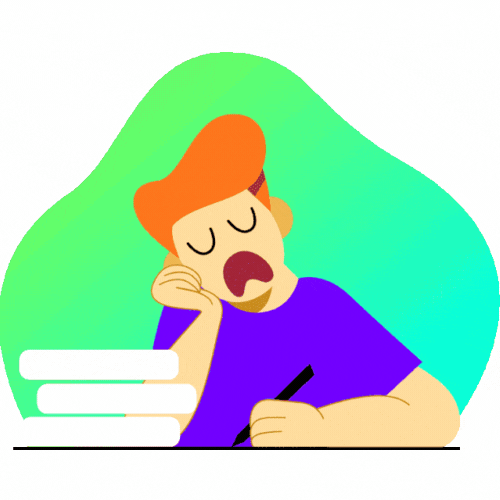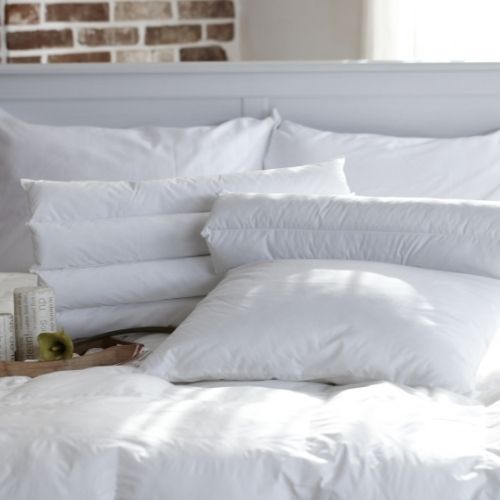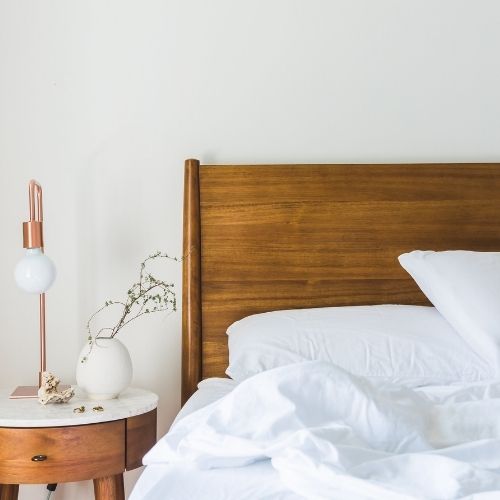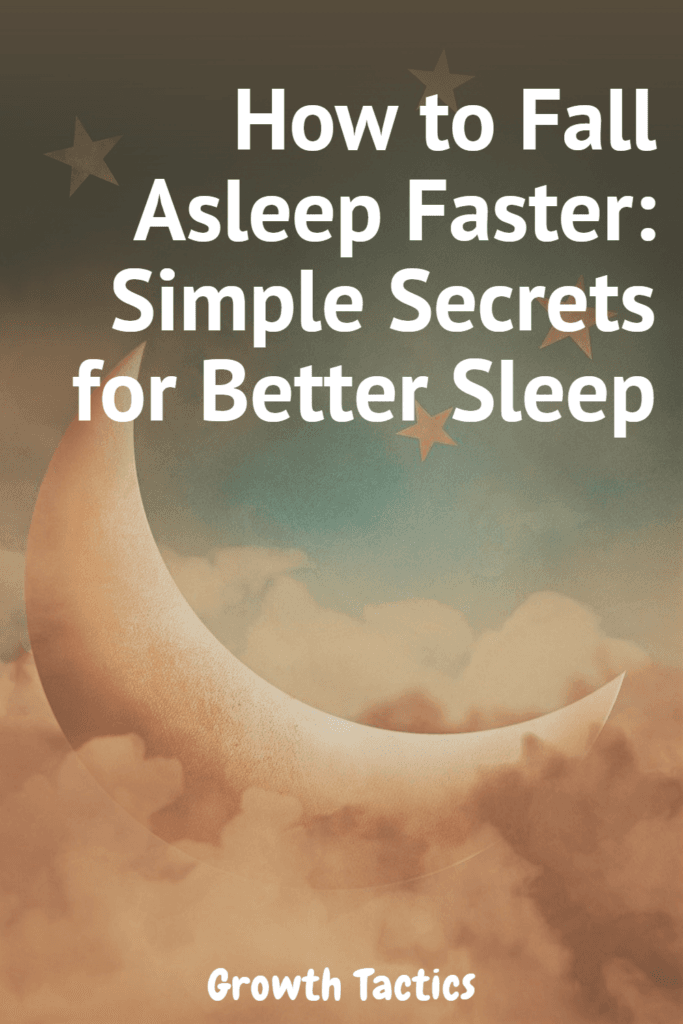Have you ever laid in bed, staring at the ceiling, wondering why you can’t fall asleep faster? You’re not alone. Many of us experience nights where falling asleep feels like a distant dream.
But don’t worry, there are simple secrets to help you fall asleep quickly and improve your sleep quality. This guide highlights easy, practical tips that empower you to discover your own sleep solutions.
Ready to start your journey to better sleep? Let’s jump right in!
Jump To Section
Understanding the Sleep Puzzle

The Role of Sleep Quality
Sleep quality is key to feeling good and staying healthy. It’s not just about how long you sleep. Imagine your mind and body as a team, working together every night to recharge.
Good sleep quality means you wake up feeling fresh, mentally sharp, and ready to tackle challenges. Bad sleep? It leaves you tired, grumpy, and struggling to focus. Even if you spend many hours in bed, without good sleep quality, you won’t feel rested.
Why Falling Asleep Matters
Falling asleep easily makes a big difference in your life. When you struggle to fall asleep, it’s not just about losing sleep. This struggle affects your mood, your energy, and your ability to handle stress.
If you can’t fall asleep, you may toss and turn, worrying and feeling frustrated. This can make your sleep even worse. It’s a cycle that hurts your sleep quality and impacts your days. Understanding why sleep matters helps you find ways to improve it.
A Peek at Scientific Insights
Science offers valuable insights into sleep. A systematic review and meta-analysis examined data from many studies to understand sleep cycles better. They found that certain habits and patterns can improve your sleep.
By learning from these scientific insights, you can make informed decisions about your sleep routine. Knowledge is power. Use this information to adjust your habits and discover what works best for you.
Building a Sleep-Ready Environment

Create a Cozy Sleep Space
Your bedroom should feel like a calm and relaxing haven. Pay attention to these factors to create a cozy sleep space:
- Room Temperature: Keep your room cool. Most people sleep best in a room that is around 65 degrees Fahrenheit.
- Lighting: Use dim lights in the evening to signal to your brain that it’s time to wind down. Consider blackout curtains or a sleep mask to block out light.
- Noise: Silence distractions. Use earplugs, a white noise machine, or a fan to drown out disruptive sounds.
These little changes can make a big difference. Customize your sleep environment to match your preferences and create a calming space that invites relaxation.
Sleep Hygiene Habits
Good sleep hygiene is about creating habits that encourage restful sleep. Here are some key habits to consider:
- Consistent Sleep Schedule: Go to bed and wake up at the same time every day, even on weekends. Try to get the same hours of sleep each night. This helps regulate your body’s sleep-wake cycle.
- Pre-Sleep Routine: Develop a calming routine before bed. This might include reading a book, taking a warm bath, or practicing relaxation exercises like deep breathing or meditation.
- Limit Stimulants: Avoid heavy meals, caffeine, and electronics before bedtime. These can interfere with your ability to fall asleep.
Remember, what works best is unique to you. Use these tips as a foundation to build your own sleep hygiene habits. Prioritize your sleep and see the positive impact it has on your overall well-being. Be mindful of creating a purpose-driven sleep routine that supports your leadership and personal growth.
Understanding Your Own Circadian Rhythm
Every person has a natural body clock. It’s called the circadian rhythm. This internal clock tells your body when it’s time to sleep and wake up. Aligning with it can help you achieve better sleep.
Discover Your Sleep Patterns
To harness your circadian rhythm, pay attention to your body. Notice when you feel most awake and when you start feeling sleepy. This awareness helps you find your natural sleep-wake cycle.
Consistency is Key
Once you understand your patterns, try to sleep and wake up at the same time every day. This consistency helps reinforce your natural rhythm. Over time, sticking to this schedule makes falling asleep and waking up easier.
Maximizing Daylight and Darkness
Let natural light guide your rhythm. Get sunlight during the day. It boosts your mood and energy levels. In the evening, dim your lights. This signals your body that it’s time to wind down leading to more healthy sleep.
Empowering Your Mind for Sleep
Mindfulness Meditation and Relaxation
Mindfulness meditation can be a powerful tool for better sleep. This practice helps reduce stress, helps you fall asleep faster, and improves sleep quality.
When you meditate, you focus on the present moment. This focus quiets your racing thoughts and calms your mind. You can start by sitting in a comfortable position and taking deep breaths. Pay attention to your breath going in and out. If your mind wanders, gently bring your focus back to your breathing.
Incorporating mindfulness meditation into your nightly routine can help your body know it’s time to relax. Over time, this builds a strong link between relaxation and bedtime.
Embracing Lifestyle Changes

Balancing Activity and Rest
Finding the right balance between activity and rest will help you achieve better sleep. During the day, physical activity helps tire your body. This boosts your mood and energy and sets the stage for restful sleep at night.
However, don’t forget to pair activity with rest. Carve out time to relax, letting your body and mind unwind from the day’s demands. Avoid long naps, as these can throw off your sleep cycle and make it harder to fall asleep at night. Instead, focus on getting enough rest during your regular sleep hours.
Everyone’s balance is different. Trust yourself to discover a routine that suits you best. This pursuit is not one-size-fits-all but a personal journey toward better sleep.
Diet and Sleep
What you eat and drink makes a big difference in your sleep. To set yourself up for success, pay attention to these tips:
- Eat Light at Night: Avoid heavy meals close to bedtime. Opt for lighter options if you feel hungry later in the day.
- Watch the Caffeine and Sugar: These can keep your mind buzzing. Try to limit them, especially in the afternoon and evening.
- Stay Hydrated, but Balance It: Drink enough water, but not too much right before bed. This helps you avoid waking up for a bathroom trip in the middle of the night.
Making these small adjustments can have a big impact. Each step you take toward improving your sleep is an investment in a healthier, happier you.
Solutions for Common Sleep Challenges

Overcoming Trouble Falling Asleep
Struggling to fall asleep or stay asleep is a common issue. Stress and chronic insomnia often play a big part in this challenge. Here are some practical steps to help you find relief:
- Create a Relaxing Routine: Start winding down 30 minutes before bed. Read a book, listen to calming music, or take a warm bath. This helps reduce anxiety and signals to your brain that it’s time to sleep.
- Mind Your Thoughts: Stress and racing thoughts can keep you awake. Try deep breathing exercises, journaling, or practicing mindfulness to calm your mind.
- Be Consistent: Go to bed and wake up at the same time every day. This helps regulate your body’s internal clock.
Remember, these strategies may need time to show results. Be patient and find what works best for you. It’s crucial to tailor these techniques to your unique needs and life circumstances.
Managing Sleep Disorders
Sleep disorders like sleep apnea need more attention. Understanding these conditions is the first step to managing them effectively.
Sleep Apnea: This disorder causes breathing to stop and start during sleep. Common signs include loud snoring or feeling tired even after a full night’s sleep. If you suspect you have sleep apnea, seek a healthcare professional. They might recommend a sleep study to diagnose the condition.
Knowing when to seek help is important. Professionals can guide you toward the right treatment and help you get the quality sleep you need. Remember, taking action shows you’re committed to your personal growth and well-being. Every step you take is a purposeful move toward better health and vitality.
Dealing with Nighttime Disruptions
Interruptions during the night can be frustrating. They can prevent you from getting the restful sleep you need. Here are some tips to handle these disruptions:
- Minimize Noise: If external sounds disturb your sleep, consider using earplugs or a white noise machine. These can create a more peaceful sleep environment.
- Stay Cool: Keep your bedroom cool enough to promote sleep. Adjust the thermostat or use a fan to find your comfort level.
- Limit Light Exposure: Bright lights can wake you up. Use blackout curtains and dim any lights in your room. Avoid screen time before bed, as well.
Tackling Restless Legs Syndrome
Restless Legs Syndrome (RLS) is another common challenge. The urge to move your legs causes difficulty falling asleep. Here’s what you can do:
- Check Your Diet: Keep an eye on your iron levels. Sometimes, low iron can worsen RLS. Speak with your doctor about any dietary changes or supplements.
- Stay Active: Regular, moderate exercise can help ease symptoms. However, avoid intense workouts close to bedtime.
- Establish a Routine: A consistent bedtime routine can help manage RLS. Relax with activities like stretches or a warm bath before sleep.
Each sleep challenge requires a unique approach. By addressing these issues with purposeful actions, you lead yourself to a more restful and healthy life. Remember, your path to better sleep is personal and customizable. Embrace your individuality and find solutions that work best for you.
Conquering Insomnia
Insomnia, the inability to sleep, is a tough challenge. It affects your mood, energy, and overall health. Here are some strategies to help you conquer it:
- Adopt Good Sleep Hygiene: Keep your sleep environment quiet, dark, and cool. Use your bed only for sleep and intimacy, not for work or watching TV.
- Set a Sleep Schedule: Go to bed and wake up at the same time every day, even on weekends. This helps regulate your internal clock.
- Limit Naps: If you must nap, keep it short. No more than 20-30 minutes. Long naps can interfere with nighttime sleep.
Should You Use Medication to Fall Asleep Faster and Improve Sleep?
Finding restful sleep is a journey. It can be easy to think that sleep medicine might be the quick fix you need. But before you go down that path, let’s talk about why it’s often better to avoid medication unless a doctor advises it.
Natural Sleep Solutions First
Relying on sleep aids can sometimes mask the real issues causing your sleep problems. Instead, start by improving your sleep habits and environment like we discussed earlier in the article.
When Medication May Be Necessary
Sometimes, sleep problems are more than just a matter of routine or environment. If you have tried improving your sleep habits without success, it might be time to speak with a doctor. They can help you understand whether medication is right for you.
Doctors can prescribe medication if they determine it’s necessary for your health. They have the knowledge and experience to find the safest and most effective treatment for your needs.
Risks of Using Medication Without Guidance
Using sleep medication without a doctor’s advice can lead to side effects or dependence. Medications may help you fall asleep, but they won’t necessarily address the root cause of your sleep issues. Long-term use can also affect your overall health and well-being.
- Side Effects: Sleep medications can cause grogginess, dizziness, and even memory problems. Not all medications work the same for everyone, and a doctor can help manage these risks.
- Dependence: Relying on medication can make it hard to sleep without it. This dependence can lead to more severe sleep issues and make it harder to find natural solutions.
Embrace Individual Solutions
Your path to better sleep doesn’t have to rely on medication. Each person is unique, and what’s important is finding what works for you. If you’ve exhausted your options and still struggle, seeking professional advice is a strong move. It shows your commitment to personal growth and problem-solving.
Remember, the road to restful sleep is personal and full of purpose-driven action. Improve your sleep habits, create a peaceful environment, and seek guidance when needed. In doing so, you take charge of your sleep health in a way that aligns with your individual needs and goals.
When to See a Medical Professional About Trouble Falling Asleep
Sometimes, no matter how hard you try, sleep just won’t come. It’s important to know when to seek help. Understanding your sleep issues is part of taking control of your health.
Persistent Sleep Issues
If you’ve been struggling to fall asleep for more than a few weeks, this could be a sign of a bigger issue. Sleep is vital for your health and functioning, and ongoing problems deserve attention.
Impact on Daily Life
When lack of sleep affects your daily life, it’s time to consult a professional. Are you feeling tired all day? Is your mood affected? Difficulty concentrating, irritability, and fatigue are all signs that you need to see a doctor.
Other Health Symptoms
Sometimes, trouble sleeping can be linked to other health issues. Nighttime breathing problems, frequent waking, or leg jerks can signal conditions like sleep apnea or restless leg syndrome. These require a specialist’s expertise.
What to Expect
When you see a doctor, they will ask about your sleep habits and overall health. Be honest and detailed. This helps them understand your situation better. They might suggest lifestyle changes, therapies, or even medications to help you get the rest you need.
Take Action for Your Well-being
Remember, seeking help is a strong, proactive step. It’s about improving your well-being and leading a life with purpose. Every person’s journey is unique, and getting professional advice can provide the guidance you need.
Don’t wait too long if sleep troubles persist. Your well-being is worth the effort. Empower yourself by seeking the help you need to get restful, restorative sleep.
Conclusion
Sleep is not just a routine but a chance to rejuvenate. By creating a sleep-friendly lifestyle, you can fall asleep faster, improve your sleep, and be ready for each new day. Remember, what works for you is unique. Find joy and curiosity in exploring these tips, as you work towards your personal goal of better sleep. Take action, and watch as restful nights transform your life!


